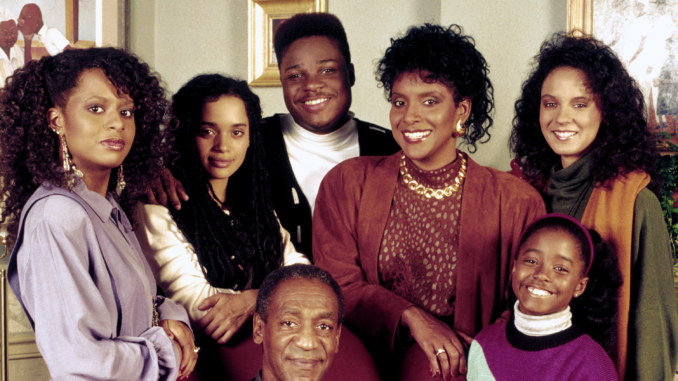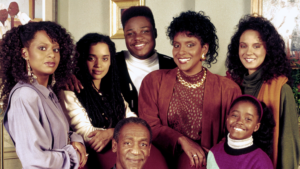
When The Cosby Show first aired in 1984, it became an instant cultural phenomenon. It wasn’t just another sitcom – it was a game-changer, a show that challenged norms and pushed the boundaries of television. For many, the Huxtable family became a symbol of success, love, and integrity. But what was it about The Cosby Show that made it a landmark in TV history?
The show’s premise was simple: Bill Cosby, as Dr. Cliff Huxtable, and Phylicia Rashad, as his wife Clair, raised a loving family of five children in an upper-middle-class New York household. But the simplicity of its premise belied the profound cultural shifts it instigated.
Breaking Barriers and Stereotypes
Before The Cosby Show, television had largely depicted Black families as either struggling or comic relief. Sitcoms featuring African American families, such as Good Times and The Jeffersons, had predominantly focused on working-class struggles. While these shows were important in their own right, they often reinforced negative stereotypes of Black life in America.
Enter The Cosby Show. With an affluent Black family at its center, the show portrayed a realistic, successful, and happy household where the parents were well-educated professionals, the children were ambitious, and the family faced everyday challenges that transcended race. This was revolutionary.
The Huxtables defied every stereotype that had been built around Black families on television. Cliff Huxtable was a lovable, intelligent, and humorous father figure, while Clair was a strong, independent mother and lawyer. The children were not just accessories; they were vibrant, individual characters with their own dreams and personalities.
By depicting an African American family in a positive light, The Cosby Show presented an image that Black viewers rarely saw on television and that white audiences hadn’t fully considered. It shattered the idea that a successful Black family was an anomaly and proved that representation mattered.
Redefining Family Television
The Cosby Show also redefined what a family sitcom could be. It tackled serious issues – from race and class to education and relationships – with a delicate blend of humor and sincerity. Yet, it never became preachy. Through the humorous lens of the Huxtables’ everyday lives, the show explored complex themes in a relatable way.
The way The Cosby Show approached these topics set it apart from its contemporaries. Family sitcoms at the time tended to focus on slapstick humor or light-hearted family dilemmas. The Cosby Show was different in its ability to weave serious discussions into its comedic fabric. For example, the show addressed themes such as the importance of education, the pressure to succeed, and balancing family life with professional ambitions, all while maintaining an engaging sense of humor.
One of the most notable moments in television history came in the second season of The Cosby Show, when Cliff Huxtable had an emotional conversation with his son Theo about his struggles with dyslexia. It wasn’t just the sensitive portrayal of Theo’s struggle; it was the realistic way the family dealt with it. This was television showing a family overcoming an obstacle, not just surviving it.
Behind the Scenes: The Power of Diversity
The groundbreaking success of The Cosby Show wasn’t just due to its content, but also the diversity in its production. The show’s creator, Bill Cosby, worked tirelessly to ensure that the people behind the scenes matched the diversity on-screen. The writing staff, directors, and crew were a mix of Black and white professionals, creating a dynamic environment that fostered creativity.
For the cast, being part of the show meant breaking new ground. Phylicia Rashad, who played Clair Huxtable, became the first Black woman to lead a prime-time drama series. The show’s success led to several spin-offs and ultimately opened the door for more shows featuring diverse casts, such as A Different World, Family Matters, and Fresh Prince of Bel-Air.
The chemistry between the cast was another significant factor in the show’s success. The way Bill Cosby and Phylicia Rashad portrayed Cliff and Clair, effortlessly balancing comedy with heartfelt moments, is still regarded as one of the greatest portrayals of a married couple in television history. The children – Malcolm-Jamal Warner, Tempestt Bledsoe, Keshia Knight Pulliam, Lisa Bonet, and Geoffrey Owens – were all perfectly cast, contributing to the show’s ability to strike the perfect balance of humor, love, and life lessons.

Lasting Legacy
Despite the controversy that would later tarnish Bill Cosby’s personal life and career, the cultural impact of The Cosby Show remains undeniable. The series broke boundaries, paved the way for more diverse stories on TV, and influenced generations of viewers, writers, and actors.
Even as the world has changed, the core messages of The Cosby Show — the importance of family, education, and self-respect — still resonate with audiences today. For younger generations who were not around when the show originally aired, the Huxtables remain a symbol of a certain ideal, representing a loving, functional family dynamic that continues to inspire.
